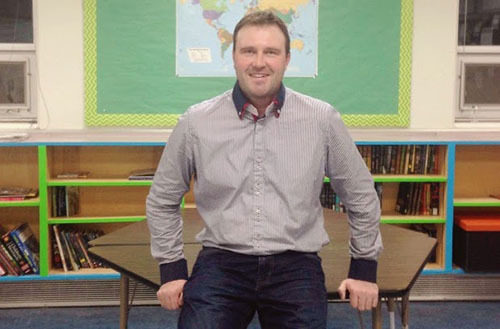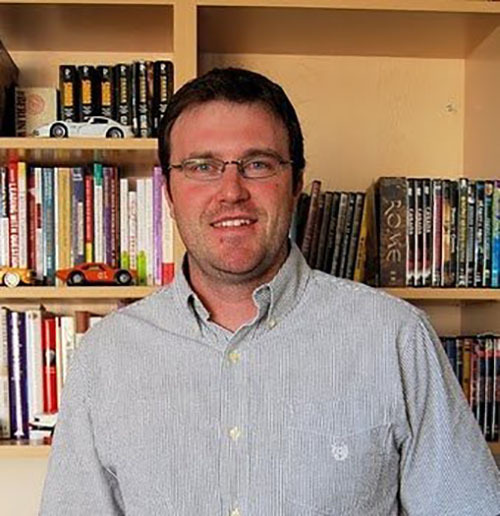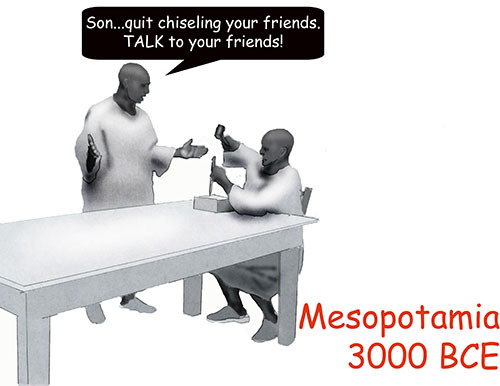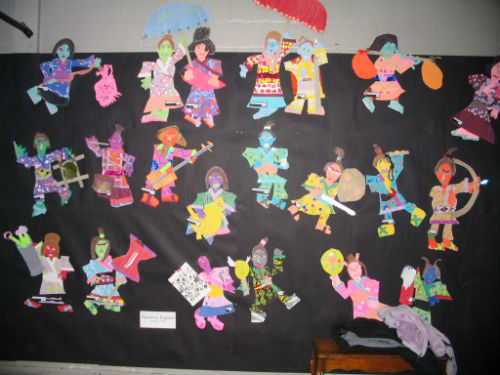
Mi hiányzik a Top 12 Global Blogger Joe Bower nagyon. Joe, progresszív és tehetséges oktató: Red Deer, Alberta, Kanada nemrég halt meg egy masszív szívroham évesen 37. Az ő rendszeresen részt vett az oldal tetejére 12 Global tanár Blogger sorozat minden hónap, Joe inspirálta csapatunk óriási valamint több ezer oktatók a világ minden tájáról.
Egy személyes megjegyzés, I was delighted to discover I shared a mutual passion with Joe when I worked with him on our November 2015 blog that focused on games that really help students learn. During the back and forth on his article, he asked me if he could write about board games (versus video games). He explained that he’d been working in a Children’s Inpatient Psychiatric Assessment Unit, and he found that board games were a great way in the first instance to establish a trusting, caring relationship with an emotionally challenged child. Being a lover and believer all my life in the many merits of board games, Joe’s idea completely resonated with me. He wrote in his “For the Love of Learning” blog on this topic and noted that beyond being an important relationship builder, this form of play was also “a great way of assessing a children’s skills including their creativity, együttműködés, alkalmazkodóképesség, rugalmasság, kritikai gondolkodás, problémamegoldás, türelem, olvasási és számolási.”
And so Joe – thank you for your amazing mind, your compassionate soul, your ideas, your commitment to education, all of which will live on through your legacy. “For the Love of Learning” from you and from each other, so that we may ultimately help learners everywhere to shine, we shall continue to share teachers’ perspectives each month as I know you would want us to.
Ebben a hónapban, we posed this question to our Top 12 Global Tanár Bloggerek: What lessons can teachers offer to designers of software for the classroom? New learning tools can mean new ways to engage students, but this month our experts from classrooms around the world have shared their ideas and feedback on this topic. So listen up Silicon Valley!
Richard Wells’ (@EduWells) book on New Zealand education will be released in 2017. In his blog this month, Richard emphasizes the importance of making technology adaptable to the learner’s needs saying, “successful apps need to reflect a world where everyone expects to be able to personalize their own experience.” Tovább.
Pauline Hawkins (PaulineDHawkins) szerzője Nem gyakori Core: 25 Ways to Help Your Child Succeed In a Cookie Cutter Educational System, notes that students are not easily fooled: “Students are not impressed with cheesy gimmicks or things that try to imitate what they like but in an “educational” way.” High school students in particular are sophisticated consumers and should be treated as such by tech manufacturers. She also says that students learn at different rates and educational programs should be easily adjustable to different complexity settings. Tovább.
In his blog, Adam Steiner (steineredtech) observes that while there are great programs that give students the power to create amazing multimedia content, “what has lagged behind are tools that support specific subject areas. There are too few options for maximizing student engagement in social studies, Angol, tudomány, and math.” He urges education tech companies to never overlook the importance of content. Tovább.
Vicki Davis (coolcatteacher) brings to light the important fact that different kids have different achievement motivators. Some students value socialization or exploration while others need success markers like status upgrades and leader boards. She also emphasizes the consideration of aesthetics: “Face it, many education technology platforms need a face lift.” Tovább.
Todd Finley (finleyt) believes that a good way for tech companies to make sure they meet the needs of students and educators is to actually invite education researchers, gyerekek, and teachers to help the design team. He also thinks that software should not distract or take away from learning. “Software should be intuitive enough for instructors to learn quickly. Ami még fontosabb, the tool should not add to students’ cognitive load.” Tovább.
In his post, Craig Kemp (mrkempnz) calls attention to the social needs of students. Students are human animals with the strong urge to interact with each other. They are best engaged by technology that consists of some form of communication. Tovább.
Tom Bennett (@ Tombennett71), Joe Bower (joe_bower), Susan Bowles (FloridaKteacher), Lisa Currie (RippleKindness), Vicki Davis (coolcatteacher), Todd Finley (finleyt), Pauline Hawkins (PaulineDHawkins), Craig Kemp (mrkempnz), Karen Lirenman (KLirenman), Adam Steiner (steineredtech), Silvia Tolisano (langwitches) és Richard Wells (@EduWells) vannak A Global Search for Education 2014 Top 12 Global Tanár Bloggerek.


Csatlakozz hozzám és világszerte elismert szellemi vezetők többek között Sir Michael Barber (UK), DR. Michael blokk (Az US), DR. Leon Botstein (Az US), Professzor Clay Christensen (Az US), DR. Linda Darling-Hammond (Az US), DR. MadhavChavan (India), Professzor Michael Fullan (Kanada), Professzor Howard Gardner (Az US), Professzor Andy Hargreaves (Az US), Professzor Yvonne Hellman (Hollandiában), Professzor Kristin Helstad (Norvégia), Jean Hendrickson (Az US), Professzor Rose Hipkins (Új-Zéland), Professzor Cornelia Hoogland (Kanada), Tisztelt Jeff Johnson (Kanada), Mrs. Chantal Kaufmann (Belgium), DR. EijaKauppinen (Finnország), Államtitkár TapioKosunen (Finnország), Professzor Dominique Lafontaine (Belgium), Professor Hugh Lauder (UK), Lord Ken Macdonald (UK), Professor Geoff Masters (Ausztrália), Professzor Barry McGaw (Ausztrália), Shiv Nadar (India), Professzor R. Natarajan (India), DR. PAK NG (Szingapúr), DR. Denise Pope (US), Sridhar Rajagopalan (India), DR. Diane Ravitch (Az US), Richard Wilson Riley (Az US), Sir Ken Robinson (UK), Professzor Pasi Sahlberg (Finnország), Professzor Manabu Sato (Japán), Andreas Schleicher (PISA, OECD), DR. Anthony Seldon (UK), DR. David Shaffer (Az US), DR. Kirsten Magával ragadó Are (Norvégia), Chancellor Stephen Spahn (Az US), Yves Theze (LyceeFrancais számú amerikai egyesült államokbeli), Professor Charles Ungerleider (Kanada), Professzor Tony Wagner (Az US), Sir David Watson (UK), Professzor Dylan Wiliam (UK), DR. Mark Wormald (UK), Professzor Theo Wubbels (Hollandiában), Professzor Michael Young (UK), és professzor Minxuan Zhang (Kína) mivel azok feltárása a nagy kép oktatási kérdés, hogy minden nemzet ma szembesül.
A Global Search Oktatási közösségi oldal
C. M. Rubin a szerző két legolvasottabb internetes sorozat, amely megkapta a 2011 Upton Sinclair díjat, “A Global Search for Education” és “Hogyan fogjuk olvasása?” Ő a szerzője a három bestseller könyv, Beleértve The Real Alice Csodaországban, a kiadó CMRubinWorld, és egy Disruptor Alapítvány ösztöndíjasa.
Kövesse C. M. Rubin on Twitter: www.twitter.com/@cmrubinworld





Legutóbbi hozzászólások